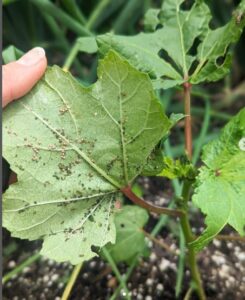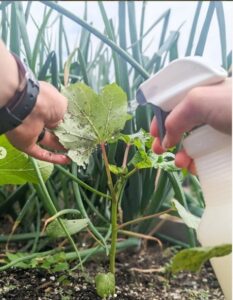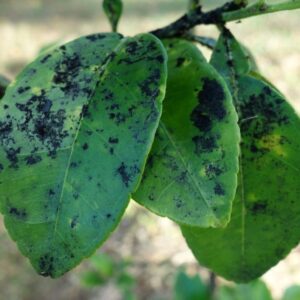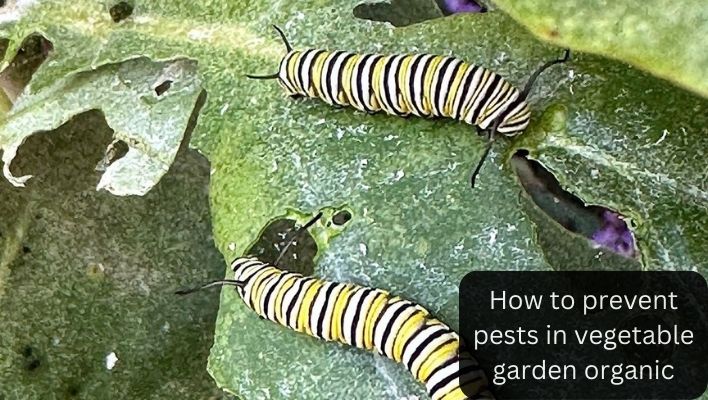Organic gardening is the practice of growing plants without the use of synthetic fertilizers and pesticides. It is a sustainable and environmentally friendly way to grow your food. However, one of the biggest challenges in organic gardening is preventing pests from damaging your crops. Pests such as aphids, caterpillars, and mites can quickly destroy a vegetable garden if left unchecked.
Are you tired of pests ruining your vegetable garden? You’re not alone. Many gardeners struggle with pests like aphids, caterpillars, and mites, which can quickly devour your hard work. But what if we told you that there’s a way to prevent pests naturally and organically? That’s right – you don’t have to resort to harmful chemicals to protect your crops.
In this article, we’ll share some tried and true techniques for keeping pests at bay, so you can enjoy a bountiful harvest. Whether you’re a seasoned gardener or just starting, these tips will help you maintain a healthy and thriving vegetable garden. So, put on your gardening gloves, and let’s get started.
Identifying Garden Pests
Pests in your vegetable garden can cause significant damage if left unchecked. It’s important to catch pest infestations early before they can cause significant damage to your vegetable garden.
Before you can effectively prevent pests in your vegetable garden, you need to know what you’re dealing with. Here are some common garden pests to look out for:
Aphids:
These small, pear-shaped insects can be found on the undersides of leaves and stems. They suck the sap out of plants, causing stunted growth and distorted leaves.
- Signs: Stunted growth, distorted leaves, and a sticky residue on leaves are all signs of an aphid infestation.
- Damage: Aphids can cause stunted growth and distorted leaves. They can also spread viruses between plants.
Caterpillars:
Caterpillars are the larval stage of moths and butterflies. They can be found chewing holes in leaves and can quickly defoliate a plant if left unchecked.
- Signs: Holes in leaves, missing foliage, and droppings on leaves are signs of a caterpillar infestation.
- Damage: Caterpillars can quickly defoliate a plant if left unchecked, leading to reduced yields or even plant death.
Mites:
These tiny pests can be difficult to spot with the naked eye. They typically feed on the undersides of leaves, causing them to turn yellow and fall off.
- Signs: Yellowing leaves, a speckled appearance on leaves, and webbing on plants are signs of a mite infestation.
- Damage: Mites can cause yellowing and dropping of leaves, which can reduce the plant’s ability to produce fruit.

Whiteflies:
These small, moth-like insects feed on the sap of plants and can quickly multiply, causing a sticky residue on leaves and attracting ants.
- Signs: A sticky residue on leaves, yellowing leaves, and black sooty mold on leaves are signs of a whitefly infestation.
- Damage: Whiteflies can cause yellowing and wilting of leaves, which can lead to reduced yields.
Slugs and Snails:
These slimy pests can quickly devour young seedlings and leave large holes in leaves.
- Signs: Slime trails on leaves and around plants, holes in leaves, and missing foliage are signs of a slug or snail infestation.
- Damage: Slugs and snails can devour young seedlings and leave large holes in leaves, which can lead to reduced yields.
Thrips:
These slender, winged insects feed on plant sap and cause leaves to appear speckled or silver.
- Signs: Silver or bronze-colored streaks on leaves, distorted or discolored flowers, and black feces on leaves are signs of a thrip infestation.
- Damage: Thrips can cause stunted growth and distorted flowers. They can also spread viruses between plants.
Leafhoppers:
These small, wedge-shaped insects can jump long distances and cause yellowing and curling of leaves.
- Signs: Yellowing or curling of leaves, a stippled appearance on leaves, and brown scarring on leaves are signs of a leafhopper infestation.
- Damage: Leafhoppers can cause yellowing and curling of leaves, which can reduce the plant’s ability to photosynthesize.
Beetles:
There are several types of beetles that can damage vegetable plants, including the Colorado potato beetle and the flea beetle. They can cause defoliation and stunted growth.
- Signs: Holes in leaves, skeletonized leaves, and missing foliage are signs of a beetle infestation.
- Damage: Beetles can cause defoliation and stunted growth, leading to reduced yields.
Root maggots:
These pests feed on the roots of plants and can cause wilting and yellowing of leaves.
- Signs: Wilting or yellowing of leaves, stunted growth, and maggots in the soil are signs of a root maggot infestation.
- Damage: Root maggots can cause wilting and yellowing of leaves, leading to reduced yields or even plant death.
Cutworms:
These caterpillar-like pests can cut through the stems of young plants, causing them to wilt and die.
- Signs: Plants that have been cut off at the stem, wilting plants, and holes in leaves are signs of a cutworm infestation.
- Damage: Cutworms can cut through the stems of young plants, causing them to wilt and die.
By keeping an eye out for these common garden pests, and signs of infestation, you can take action to prevent them from causing damage to your vegetable garden.
Ways to Get Rid of Common Garden Pests
There are several techniques you can use to control pests in your organic vegetable garden. Here are some effective methods:

- Handpicking: Simply picking pests off your plants can be an effective way to control infestations, especially for larger pests like caterpillars and beetles.
- Companion planting: Planting certain crops together can help repel pests, such as planting marigolds near tomato plants to repel aphids.
- Beneficial insects: Encouraging beneficial insects like ladybugs and lacewings can help control pest populations, as they feed on pests like aphids and caterpillars.
- Neem oil: A natural oil made from the seeds of the neem tree, neem oil can repel and kill a variety of pests.
- Insecticidal soap: A soap made from natural ingredients like potassium salts and fatty acids, insecticidal soap can be effective against soft-bodied pests like aphids and mites.
- Diatomaceous earth: Made from the fossilized remains of tiny aquatic organisms, diatomaceous earth is a natural pest control that can be sprinkled around plants to repel and kill pests.
- Row covers: Covering your plants with lightweight fabric can prevent pests from accessing them, particularly pests like caterpillars and moths.
- Crop rotation: Rotating your crops each year can help prevent the buildup of pest populations in the soil.
- Homemade remedies: Many homemade remedies can be effective against pests, such as garlic and chili pepper spray for repelling aphids.
- Physical barriers: Using physical barriers such as netting or screens can prevent pests from accessing your plants, particularly pests like birds and squirrels.
- Traps: Traps can be effective for catching and removing certain pests, such as slugs or fruit flies.
- Cultural practices: Certain cultural practices like pruning, weeding, and maintaining healthy soil can help prevent pest infestations by promoting plant health and reducing pest habitat.
- Organic pesticides: There are several organic pesticides that can be used to control pests in your garden, such as pyrethrin or spinosad.
It’s important to note that while these methods are effective, it’s also important to maintain a healthy garden environment. A healthy, well-maintained garden is less susceptible to pest infestations, so ensure that you’re providing your plants with proper nutrition and watering, and keeping the garden free of debris and weeds.
By using a combination of these control techniques and maintaining a healthy garden environment, you can effectively prevent and manage pest infestations in your organic vegetable garden, leading to a bountiful and healthy harvest.
Best Organic Pesticides
Organic pesticides are a great option for controlling pests in your organic vegetable garden. They are made from natural ingredients and are less harmful to the environment and beneficial insects than chemical pesticides. Here are three of the best organic pesticides available on Amazon:
Bonide Pyrethrin Garden Insect Spray
This pesticide contains pyrethrin, a natural insecticide derived from chrysanthemums. It’s effective against a wide range of pests, including aphids, beetles, and caterpillars. To use, mix with water and spray directly on the affected plants. Be sure to follow the instructions on the label for proper application rates and timing.
Monterey Garden Insect Spray
This pesticide contains spinosad, a natural compound derived from soil bacteria. It’s effective against pests like thrips, spider mites, and caterpillars. To use, mix with water and spray directly on the affected plants. Be sure to apply the spray to both the tops and undersides of leaves for maximum effectiveness.
Safer Brand 3-in-1 Garden Spray
This safer brand organic pesticide contains a combination of natural ingredients, including sulfur and pyrethrins, to control a variety of pests and fungal diseases. It’s effective against pests like aphids, beetles, and whiteflies, as well as diseases like powdery mildew and rust.
To use, mix with water and spray directly on the affected plants. Be sure to follow the instructions on the label for proper application rates and timing.
When using organic pesticides in your garden, it’s important to follow proper application methods to ensure they are effective and safe. Here are some tips:
- Apply pesticides in the early morning or evening when temperatures are cooler and beneficial insects are less active.
- Apply pesticides directly to the affected plants, being sure to cover both the tops and undersides of the leaves.
- Use a sprayer or applicator that allows for a fine mist to ensure even coverage.
- Wear protective clothing, such as gloves and a mask, to avoid skin and respiratory irritation.
- Avoid spraying on windy days to prevent drift onto beneficial plants or into nearby water sources.
Remember, organic pesticides should be used as a last resort after other control techniques have been tried. Proper cultural practices and the use of beneficial insects and physical barriers should be the first line of defense against pests in your organic vegetable garden.
How to prevent pests from Garden
Prevention is always the best approach to managing pests in your organic vegetable garden. By taking a proactive approach to pest control, you can reduce the likelihood of infestations and minimize the need for pesticides. Here are some effective prevention methods:
- Crop rotation: Rotating crops can help prevent the buildup of pests and diseases in the soil. For example, if you plant tomatoes in one spot one year, plant a different vegetable family in that spot the next year.
- Companion planting: Planting certain plants together can help repel pests or attract beneficial insects. For example, planting marigolds with your vegetables can help repel pests like aphids and nematodes.
- Intercropping: Planting multiple crops in the same area can help prevent pests from spreading. For example, planting onions and carrots together can help deter pests that are attracted to one or the other.
- Mulching: Mulching around plants can help reduce weed growth and keep the soil moist, which can help prevent stress on plants that can make them more susceptible to pests.
- Sanitation: Keeping your garden clean and free of debris can help prevent pest infestations. Remove dead or diseased plant material promptly and keep the garden free of weeds.
- Beneficial insects: Introducing beneficial insects like ladybugs or praying mantises into your garden can help control pests naturally.
- Physical barriers: Using physical barriers like netting or row covers can prevent pests from accessing your plants.
- Healthy soil: Maintaining healthy soil with proper nutrition and organic matter can help promote plant health and reduce pest infestations.
By using a combination of these prevention methods, you can effectively reduce the likelihood of pest infestations in your organic vegetable garden. Remember, prevention is key to maintaining a healthy and productive garden.

Maintenance Tips
Maintaining your organic vegetable garden is essential to preventing pest infestations and ensuring healthy plant growth. Here are some tips to help you maintain your garden:
- Watering – Water your plants regularly and deeply to promote healthy root growth. Avoid getting water on the leaves, as this can create a humid environment that can attract pests.
- Fertilizing – Use organic fertilizers to provide your plants with the nutrients they need for healthy growth. Avoid over-fertilizing, as this can make plants more susceptible to pest infestations.
- Pruning – Regularly prune your plants to remove dead or diseased material, as well as to promote healthy growth. This can also help prevent pest infestations by removing hiding places for pests.
- Weeding – Remove weeds promptly, as they can compete with your plants for nutrients and water. Weeds can also harbor pests, so keeping them under control can help prevent pest infestations.
- Inspecting – Regularly inspect your plants for signs of pest infestations or disease. Catching problems early can help prevent them from becoming more serious.
- Cleaning – Keep your gardening tools clean and disinfected to prevent the spread of disease between plants. Also, clean up any debris or dead plant material promptly to prevent the buildup of pests and diseases.
- Harvesting – Harvest your vegetables promptly when they are ripe to prevent them from becoming overripe and attracting pests.
By following these maintenance tips, you can help keep your organic vegetable garden healthy and productive while reducing the risk of pest infestations.
How to prevent pests in vegetable garden organic FAQs
Is it possible to have a pest-free garden?
While it is difficult to achieve a completely pest-free garden, it is possible to minimize pest problems through proper prevention and control techniques. By practicing good gardening habits, such as maintaining healthy soil, planting pest-resistant varieties, and practicing regular pest inspections, you can greatly reduce the risk of pest infestations in your garden.
Are all organic pesticides safe for humans?
While organic pesticides are generally considered safer than synthetic pesticides, not all organic pesticides are safe for humans. Some organic pesticides can cause skin irritation, respiratory problems, and other health issues if not used properly. It is important to carefully read and follow the instructions on the pesticide label and take necessary precautions, such as wearing protective clothing and avoiding contact with the pesticide.
How often should I apply organic pesticides?
The frequency of organic pesticide application depends on several factors, including the type of pesticide used, the severity of the pest infestation, and the specific plant being treated. It is important to carefully read the label instructions and follow the recommended application rates and intervals. In general, it is better to apply pesticides less frequently and use lower doses, as overuse can lead to pesticide resistance and other negative effects.
Can I make my organic pesticide?
Yes, it is possible to make your organic pesticide using common household ingredients such as garlic, chili pepper, and soap. However, it is important to remember that homemade pesticides may not be as effective as commercially available products and can potentially harm your plants if not used properly. It is recommended to do proper research and follow reputable recipes and application methods.
How often should I monitor my plants for pests?
It is important to regularly monitor your plants for pests to catch any infestations early before they become severe. How often you should monitor your plants depends on several factors, including the type of plants, the season, and the climate in your area. In general, it is recommended to check your plants at least once a week for signs of pests, such as holes in leaves, wilting, or discoloration.
Conclusion
Preventing pests in your organic vegetable garden is essential to ensure healthy plant growth and a bountiful harvest. By identifying pests, understanding the damage they cause, and using a combination of prevention techniques and organic pesticides, you can maintain a healthy and thriving garden.
Regular maintenance and monitoring can also help prevent and catch infestations early on. It is important to note that using organic methods for pest control not only benefits your garden but also the environment and human health.
Organic pesticides are generally safer and more sustainable than synthetic pesticides and can be effective in controlling pests when used properly. By practicing organic pest control methods, you can ensure a healthy and thriving garden while minimizing harm to the ecosystem.



